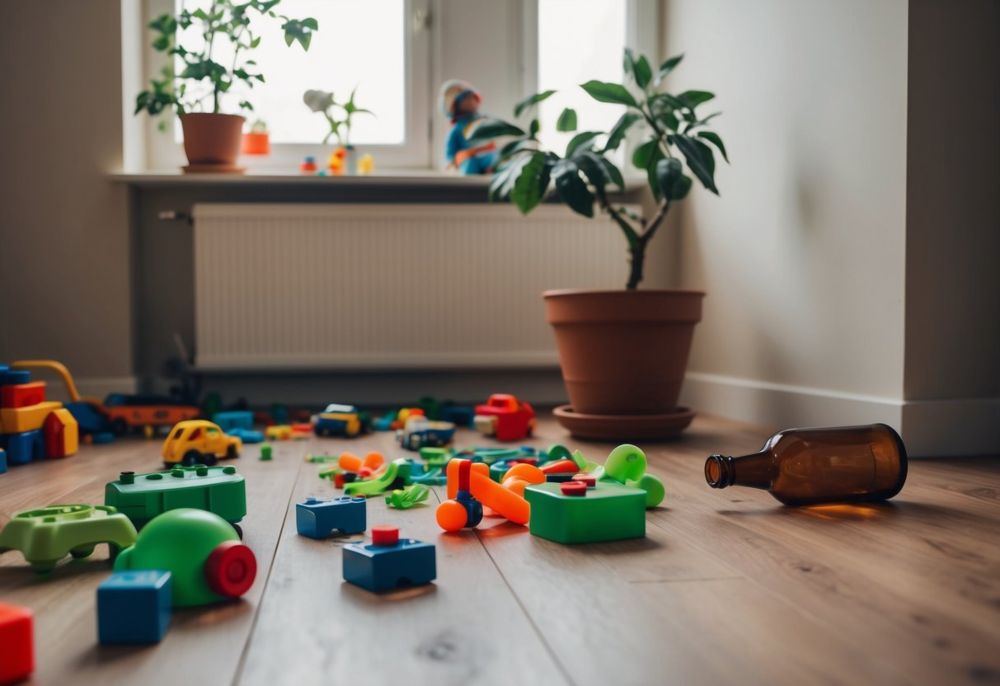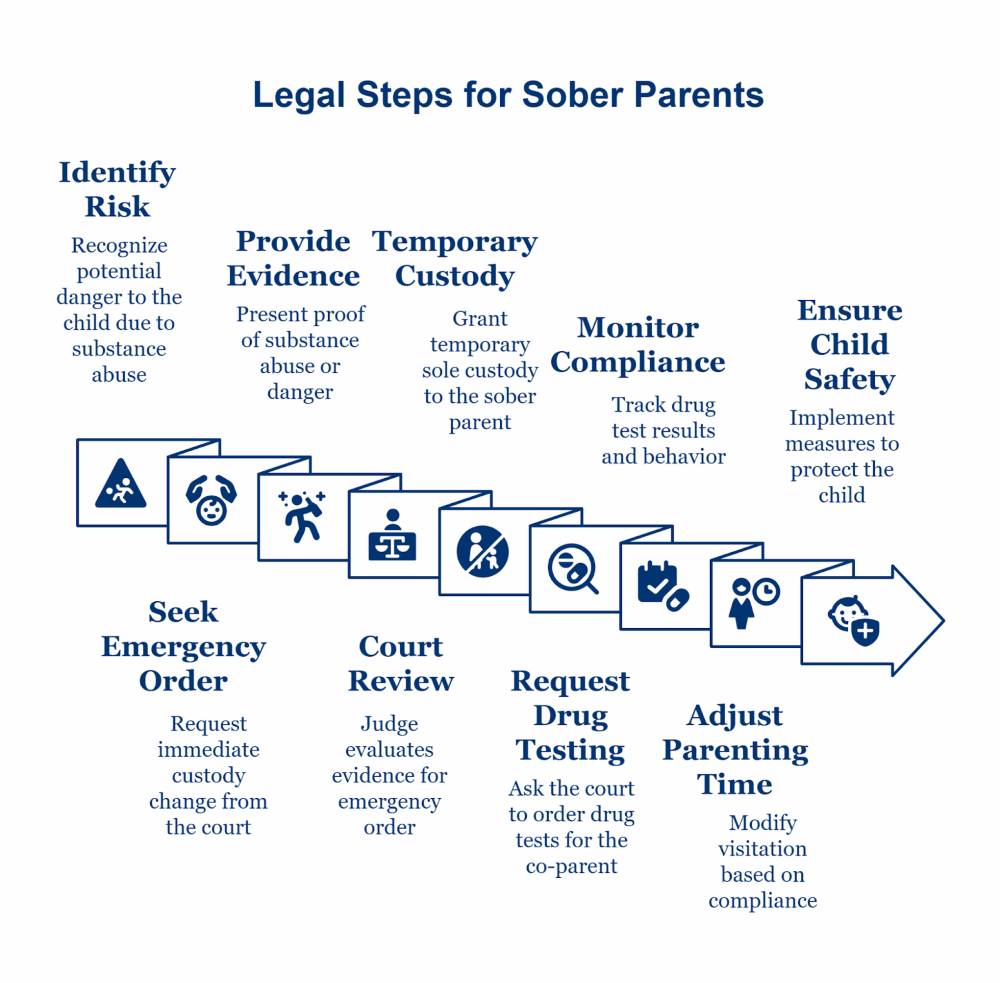

Originally published: May 2025 | Updated: August 2025
Watching your child interact with a co-parent who struggles with substance abuse can be stressful and scary.
You do have steps you can take to keep your child safe and make sure they’re okay during parenting time, even if the other parent has substance issues.
Knowing your rights and options helps you make the best choices for your family. It’s not always easy, but there are ways forward.
If you understand how addiction impacts children and what legal protections exist, you’re better equipped to build a safer environment.
This article walks you through planning safe parenting time, documenting concerns, and working with the court if changes are needed.
When a parent struggles with substance abuse, their children’s health, safety, and development often suffer. The situation affects emotions, daily life, custody rights, and legal decisions.
More than 7.5 million children in the U.S. live with a parent who has an alcohol use disorder.” – National Institute on Alcohol Abuse and Alcoholism (NIAAA)
Kids exposed to parental substance abuse face higher risks for emotional and behavioral problems.
They might feel anxious, scared, or insecure because of inconsistent parenting or unpredictable routines.
Some children withdraw, while others overachieve or try hard to please adults as a way to cope. Academic performance can drop, and attention or cognitive problems may increase.
Sometimes, neglect or even abuse happens when substance use leads to chaos at home. Healthy attachments become tough to form, and trust or self-esteem issues can crop up.
Kids living with a parent who uses drugs or alcohol often have unmet needs. Even when parents mean well, proper care can slip through the cracks.
It’s important to recognize risk factors and watch for warning signs.
Family law focuses on protecting children’s best interests in substance abuse cases. Courts treat substance abuse as a serious concern during child custody hearings.
If there’s evidence of drug or alcohol abuse, judges may set limits on parenting time or require supervised visits. Legal definitions depend on documented patterns, like failed drug tests, criminal charges, or reports from teachers and family members.
Judges can order treatment, request regular drug screens, or appoint a guardian ad litem to advocate for your child. Custody arrangements usually prioritize safety, stability, and proper care.
Both parents have legal rights, but the child’s well-being comes first. For more details, see parental substance misuse guidelines and family law custody substance abuse standards.
Worried your co-parent’s substance use is putting your child at risk? Start a legal safety plan today with Cooper Trachtenberg Law Group’s emergency custody services.
If you’re ready to get started, call us now!

If your child’s safety is at risk because of a co-parent’s substance abuse, you have legal steps you can take.
These include asking the court for immediate custody changes and requesting regular checks for your child’s protection.
If your ex is using drugs and you think your child is in danger, you can ask the court for an emergency custody order due to drug use. This order temporarily changes custody in urgent situations.
Courts move quickly in these cases, especially if there’s proof of substance abuse or danger. You might need police reports, text messages, or witness statements that show the risk.
Judges review this evidence before granting an emergency order. Often, you’ll get temporary sole custody until a hearing happens, and the other parent’s visitation may be supervised or stopped for now.
Getting sole custody because of a co-parent’s drug use can also involve longer court processes. The court needs proof that the other parent’s substance abuse harms your child’s safety, health, or well-being.
You can ask the court to require your co-parent to take a court-ordered drug test as part of your custody case. This is common if there’s a pattern of substance abuse or strong reasons to believe your ex is using drugs.
Courts may order random or regular drug tests. If the parent fails or refuses, their parenting time can be limited or supervised.
Keeping detailed records of missed visits, unsafe behavior, or suspected drug use helps your case. Sometimes, monitoring includes supervised visits or requiring your co-parent to attend treatment programs.
The main goal is a plan that keeps your child safe and, if possible, supports both parents’ roles.
If you’re parenting with a substance-abusing ex, you have tools to help protect your child and build a safer schedule. Understanding your options and using legal support really can make a difference.
Supervised visitation means a responsible adult or professional stays present during your ex’s parenting time with your child. Courts often order this when there are concerns about drug or alcohol use.
Supervised visits might happen at special visitation centers, or a family member or neutral third party might supervise. The main goal is to keep your child safe while allowing contact with the parent.
Parents usually follow strict rules about time, location, and who’s allowed to be there. Here are some common rules for supervised visitation:
These restrictions help keep your child safe. Courts may update the plan if things change based on your ex’s progress or ongoing concerns.
A parenting coordinator is a trained professional who helps you and your ex stick to the parenting plan. They can step in if parents argue or can’t agree, focusing on what’s best for your child.
Parenting coordinators keep records and can report to the court, making sure both parents follow the rules.
A guardian ad litem (GAL) is a special advocate appointed by the court for your child, especially in substance abuse cases.
The GAL talks to your child, each parent, and sometimes teachers or doctors to determine what’s happening. Then, the GAL gives the court a report with recommendations for safe parenting time.
Key tasks a GAL may handle in drug or alcohol cases:
Having a GAL or parenting coordinator means someone neutral is watching out for your child’s well-being. Honestly, that can give you more peace of mind during the process.
Don’t wait for things to escalate. Request supervised visitation or parenting restrictions now—Cooper Trachtenberg Law Group is here to help you act quickly and legally.
If you’re ready to get started, call us now!
Recording incidents and using the right tools can help you protect your children and provide clear evidence if courts get involved. Detailed records give judges a better picture of your child’s situation.
If you’re dealing with a substance-abusing co-parent, keeping thorough and factual records matters. Some of the most useful evidence includes:
This evidence can show risky patterns and support your claims during a child custody battle involving drug testing. Presenting organized, clear proof helps more in the family court than vague concerns.
Always keep records dated and detailed. Avoid exaggerating or guessing—share only the facts.
Simple tools can make tracking substance abuse and unsafe behavior easier. Many parents keep a daily journal to log incidents, including dates, times, and what happened.
Apps or digital calendars work for quick, time-stamped entries. If needed, you can use a Soberlink device or other monitoring tools to check a co-parent’s sobriety before visits.
Sometimes, the court orders regular drug or alcohol testing to help prove drug use in family court. Save all documentation in a safe place and back up digital files.
Organizing things makes it easier to share info with your lawyer or the court.
If your child’s safety is at risk due to a co-parent’s substance abuse, you may need legal changes to your parenting plan.
The court process for custody modification because of substance abuse can feel overwhelming, but sticking with the facts and taking clear steps does matter.
If you think your child isn’t safe, you can ask the court to change your custody or visitation agreement. This process is called a “petition for modification.”
Gather any proof of substance abuse, like police reports, medical records, or messages that show the problem. You’ll want to collect as much clear evidence as you can get your hands on.
File your request in the same court that created your original parenting plan. You must fill out forms and explain why your child’s safety is at risk.
Courts dealing with addiction cases look for strong evidence. If a child is harmed, they might move things along faster than usual.
If you want practical advice on safe, court-approved parenting time, check out this guide on parenting with an addicted co-parent.
Working with a family law attorney can make things smoother, but you can file on your own if necessary.
Judges focus on your child’s best interests when there’s a request to change custody because of substance abuse.
They look at the type and length of the addiction, recent relapses, and how the parents’ actions affect the child.
The court reviews evidence such as drug tests and testimonials from teachers or counselors. Judges also want to determine whether the parent is willing to get help.
Sometimes, the judge orders supervised parenting time or sets treatment conditions to keep your child safe. Sometimes, the court can make temporary changes while the case is ongoing.
Your child’s physical and emotional well-being always comes first.
Regaining child custody after addiction is possible, but you’ll need to show you’re taking real steps toward recovery. Courts want solid proof that your home is safe and stable for your child.
If you or your co-parent is trying to rebuild custody rights after substance abuse, the court expects steady progress. You’ll need reliable evidence of recovery, like:
Court officials also consider whether you follow visitation rules and meet other requirements. Keeping records and support letters helps a lot.
Being honest with the court and your co-parent can build trust, even if the process feels awkward.
Regaining custody doesn’t happen overnight. Courts usually lean toward a step-by-step plan to protect your child’s well-being.
Let’s talk about what these gradual reintroduction plans usually involve:
It helps to log every positive step, meeting, and visit along the way. Courts want to see a steady pattern of stability before changing custody arrangements.
Ready to file for custody modification? Cooper Trachtenberg Law Group can help you build the strongest case for your child’s protection. Take action today.
Can I get full custody if my co-parent is using drugs?
Yes. If you can show that your co-parent’s drug use puts your child at risk, the court may grant you full custody or restrict their parenting time through supervised visitation.
What evidence do I need to prove substance abuse in family court?
Courts accept documentation like police reports, drug test results, rehab records, and text messages referencing drug use as evidence of a parent’s substance abuse.
What is supervised visitation, and when is it used?
Supervised visitation allows a parent to spend time with their child under the watch of a neutral third party when the court believes unsupervised contact may be unsafe.
How do I file for emergency custody due to substance abuse?
File a petition in family court requesting an emergency hearing. You must provide proof that the child’s safety is at immediate risk due to the other parent’s substance use.
Can a parent regain custody after going to rehab?
Yes. If the parent completes treatment, stays sober, and meets the court’s requirements (e.g., clean drug tests, stable housing), custody can be gradually reinstated.
Will my child have to testify in a custody case involving substance abuse?
Rarely. Courts usually avoid involving children directly. A guardian ad litem or custody evaluator may represent your child’s perspective during the proceedings.
Can drug testing be ordered during a custody case?
Yes. Family courts often require drug testing when one parent alleges the other is using substances, especially if child safety is a concern.